| Srl | Item |
| 1 |
ID:
189548
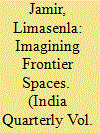

|
|
|
|
|
| Summary/Abstract |
This article concerns the northeast frontier of British India during the last years of British rule. It explores how the conundrums of the Second World War led to the reconfiguration of the northeast frontier as a strategic space in the empire’s geopolitics. This reconfiguration was pushed by contestation over the frontier spaces by different powers—threatened by the Japanese during the Second World War and, later, the possible post-war reification of Chinese and Tibetan expansionist policy towards India’s northeast frontier and the impending Indian independence. The colonial state’s strategic interest led the frontier officials to reimagine the northeast frontier, whereby the region and its local populations came to be regarded as integral to the preservation of the colonial state’s dominance.
|
|
|
|
|
|
|
|
|
|
|
|
|
|
|
|
| 2 |
ID:
127663
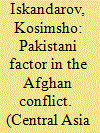

|
|
|
|
|
| Publication |
2013.
|
| Summary/Abstract |
In 1947, when Pakistan was established as an independent country, Afghanistan ceased to recognize the Durand Line, the border between India and Afghanistan drawn in 1893 under an agreement between Foreign Secretary of British India Sir Mortimer Durand and Afghan Amir Abdur Rahman Khan, and raised the question of the Pashtuns who found themselves in the newly established state. The Afghans demanded that the British either grant the Pashtuns and Balochi the right to elect their own government independent from the center or to join Afghanistan: as Afghans they should be free to decide whether they wanted to belong to any state or would prefer independence; deep at heart, however, the Afghan rulers expected that the British withdrawal from India would render the Durand Line agreement null and void. The relations between Afghanistan and Pakistan are burdened by countless problems; this explains why Pakistan keeps on interfering in its neighbor's domestic affairs.
|
|
|
|
|
|
|
|
|
|
|
|
|
|
|
|
| 3 |
ID:
172566
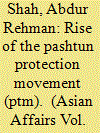

|
|
|
|
|
| Summary/Abstract |
In early 2018, the Pashtun Tahafuz Movement or Pashtun Protection Movement (PTM) came suddenly into the limelight in Pakistan. The PTM is spearheaded by young firebrand Pashtun generation mainly from the war-torn North-West Frontier region of the country. However, the movement's rhetoric and policy agenda have put it at loggerheads with Pakistan's powerful military establishment. Whilst the PTM blames the Army for the plight of Pashtuns in the country, the military has labelled the movement as a foreign ‘proxy’ working at the behest of other countries against the institutions of its own state. In essence, both parties have resorted to conspiracy theories of one sort or the other. This development has strained the nascent process of ‘mainstreaming’ the Federally Administered Tribal Areas (FATA) into becoming a normalized part of Pakistan. However, there are some encouraging political aspects and developments related to this debate. These include the increasingly wide-scale use of social media for political activism and awareness; various impacts on merger of FATA with Khyber Pakhtunkhwa; and also the successful conduct of recent provincial elections in the region.
|
|
|
|
|
|
|
|
|
|
|
|
|
|
|
|
| 4 |
ID:
127288
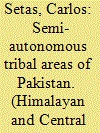

|
|
|
| 5 |
ID:
099538


|
|
|
| 6 |
ID:
119575
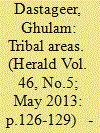

|
|
|